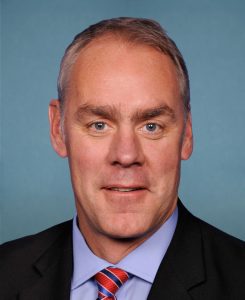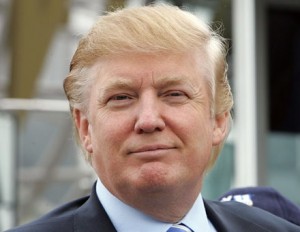What does the nascent Trump administration bode of tribal gaming? That question is vigorously bandied about in the new issue of Global Gaming Business. Although fairly circumspect in his opinions, National Indian Gaming Association Chairman Ernest Stevens Jr. sees cause for optimism in the nomination of Rep. Ryan  Zinke (R, right) for secretary of the Interior Department. In Zinke’s lone congressional term, he “established a proven record of working closely with tribes in the state of Montana on critical issues relating to law enforcement, water rights and water infrastructure, Indian housing, and tribal labor sovereignty.”
Zinke (R, right) for secretary of the Interior Department. In Zinke’s lone congressional term, he “established a proven record of working closely with tribes in the state of Montana on critical issues relating to law enforcement, water rights and water infrastructure, Indian housing, and tribal labor sovereignty.”
Stevens also hails the nomination of Judge Neal Gorsuch to the Supreme Court, citing Gorsuch’s “significant experience in federal Indian law.” Addressing the White House as much as GGB readers, Stevens reminds everyone that tribal gambling is a $30 billion industry, one that he says employs 300,000 and generates $10 billion in fees and taxes. Translation: Don’t mess with a good thing.
Two other GGB commentators focus on the president directly. Cautious optimism is the conclusion of attorney Michael J. Anderson, who chronicles Donald Trump‘s tortuous relationship with the tribal-casino industry. Most infamous is his 1993 congressional testimony against the Mashantucket Pequot Tribe,
 in which he darkly alleged organized-crime associations within Indian Country (pretty brazen accusations from the mobbed-up Trump) and said some of the Pequots did not “look” like Indians. Sounds like Trump, all right. He doubled down on the anti-tribal rhetoric when opposing a South Bend casino the following year.
in which he darkly alleged organized-crime associations within Indian Country (pretty brazen accusations from the mobbed-up Trump) and said some of the Pequots did not “look” like Indians. Sounds like Trump, all right. He doubled down on the anti-tribal rhetoric when opposing a South Bend casino the following year.
Doing a 180, Trump subsequently partnered with the Twenty-Nine Palms Band to develop Trump Twenty-Nine Palms in California, then funded efforts by the Paucatuck Eastern Pequots to achieve federal recognition. (This apparent reversal was presaged by a letter in support of the Cowlitz Tribe‘s casino pursuit.) The first partnership ended relatively amicably by Trump standards, the second less so. In another Trump flip-flop, he would oppose the recognition efforts of the St. Regis Mohawks, another confrontation that would engender some nasty rhetoric. So one can say that Trump has come down on every side of the issue but, should it arise during his presidency, tribes can produce the Cowlitz letter, which Anderson summarizes as vocalizing “support for tribal sovereignty and tribal gaming so long as it was properly regulated.”
If Anderson sees light at the end of the tunnel, for lobbyist John Tashuda the future’s so bright we’re all gonna need sunglasses. From Tashuda’s perspective, a Trump presidency will be a distinct  improvement on its two predecessors. Flouting conventional wisdom, Tashuda calls out Barack Obama for having an abysmal record on sovereignty issues, “who, when faced with a strong, bipartisan congressional effort to acknowledge and restore tribal government authority … actually issued a veto threat to deny tribes their inherent sovereign governmental authority.” Unlike Obama, Trump is expected line up with tribes against service unions like Unite-HERE.
improvement on its two predecessors. Flouting conventional wisdom, Tashuda calls out Barack Obama for having an abysmal record on sovereignty issues, “who, when faced with a strong, bipartisan congressional effort to acknowledge and restore tribal government authority … actually issued a veto threat to deny tribes their inherent sovereign governmental authority.” Unlike Obama, Trump is expected line up with tribes against service unions like Unite-HERE.
George W. Bush gets some biffing from Tashuda, too. The former “tried to stop his administration staff from even stepping foot in tribal casinos, while former President Obama not only forbade his administration people from conducting meetings at tribal casinos, he tried to stop tribal officials from conducting meetings at their own tribal casinos if federal budget dollars were paying for any part of the meeting costs.”
Besides, Tashuda says, Trump ought to favor tribal gambling because it’s a high-revenue industry that can’t be outsourced to, say, China. In that, we can all agree. (And, as long as you’re reading the magazine, check out this authoritative history of the birth of tribal gambling, penned by number-one expert Dave Palermo.)
* Speaking of matters tribal, the Hartford Courant‘s Dan Haar attempts to broker a solution to the conflict currently gripping Gov. Dannel Malloy‘s administration: Agree to drop the problematic satellite-casino initiative in return for 6% of MGM Springfield‘s take. Haar calls in an “option.” I call it a shakedown. He would also mandate that MGM be required to hire more Connecticut residents, potentially displacing Springfield-area job seekers. Haar found at least one prop for his idea in Capitol Region Council of Governments Executive Director Lyle Wray, who said, “I think it’s worth exploring. It would have to be launched at the highest level.”
As a sop to MGM, Foxwoods Resort Casino and Mohegan Sun, all of them would get a shot at an open-bidding process for a Bridgeport casino. Of course, there’s no saying that Malloy couldn’t go ahead and do that anyway, particularly with the no-bid satellite casino looking more constitutionally doomed by the day. MGM — which now counts former Sen. Joseph Lieberman among its lobbyists — appears to be sitting in the catbird seat right now and doesn’t need to buy off the Nutmeg State, as Haar proposes.
* Siegel Slots & Suites is hardly a major player in Las Vegas‘ casino scene. However, in a fairly novel development, management of its casino has been reassigned. It will now be in the hands of the Downtown Grand, which we call a step up in the world. The Nellis AFB-area motel can serve as a “farm club,” honing executives for bigger responsibilities downtown.
* “The Massachusetts Model,” as Steve Ruddock calls it, is hardly news to anyone who’s been following the post-Recession casino world. Indeed, you could argue that Steve Wynn pioneered much of it when he opened The Mirage in 1989.
* Improved Philippines business helped Bloomberry Resorts swing from a money-losing 2015 to a $46 million profit last year. While Macao struggled, Bloomberry’s Solaire Resort & Casino, near Manila, posted 29% more VIP wagering and 12% mass-market volume. Now that Macao is coming back with increasing strength, it will be interesting to see how Bloomberry’s fortunes are impacted.
* Planning a visit to Utica, New York? If Oneida County Executive Anthony Picente Jr. has his druthers, your entertainment options will include casino gambling. Rivers Casino having impinged upon Turning Stone Casino‘s market, the Oneida Indian Nation is looking to expand and recapture market share, and Picente thinks Utica is just the place to do it.

